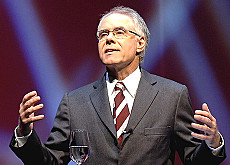Leuenberger has high hopes from new parliament

Environment and Transport Minister Moritz Leuenberger says he expects good results from the new Swiss parliament on the issues that his ministry tackles.
Leuenberger, a member of the centre-left Social Democratic Party, said that understanding for environment, transport and energy questions should increase after last Sunday’s general election.
“The bloc of Social Democrats, Greens and Liberal Greens has become a little larger. And the [centre-right] Christian Democrats made many ecological promises in their election campaign,” he commented in a wide-ranging interview with Zurich’s Tages-Anzeiger newspaper.
“And there are environmentally conscious people in the [centre-right] Radical Party and [rightwing] Swiss People’s Party. As I’ve already written in my blog: I expect something good from the new parliament,” he added.
The People’s Party gained seven seats in the House of Representatives and will now have 62 in the 200 that make up the chamber, while the Social Democrats lost nine and will have 43 seats.
Standing again
Leuenberger confirmed he was standing again for a seat in the seven-member cabinet in December’s election by parliamentarians, saying he wanted to pursue the existing policies on protection of the environment and expansion of public transport services.
Commenting on the plans by French President Nicolas Sarkozy to push France toward the vanguard of the fight against global warming, Leuenberger said they showed that environment and climate policies had nothing to do with political orientation.
“I’ve always made the point that protecting the climate and leaving resources intact for the next generation should not be ideological issues. We must all work towards these [goals].”
“[German Chancellor] Angela Merkel is committing herself in no uncertain terms to climate protection, [Governor] Arnold Schwarzenegger is doing it in California.”
He also mentioned efforts being made by the G8 group of industrialised countries, the European Union and the United Nations Secretary-General, Ban Ki-moon.
Leuenberger said it was not only Socialists or Greens who were conducting an offensive climate policy.
Change
“Only here in Switzerland was the issue ideologised in the election campaign. As soon as the new parliament begins its work, hopefully that will change,” he said.
Asked about Switzerland’s policy of moving goods transport from road to rail, Leuenberger said Switzerland was playing an “absolute pioneer role”.
“We are admired in the whole of Europe for our policy and our efficient public transport,” he commented.
An element in Swiss efforts at shifting goods from the road to rail was the introduction in 2001 of a heavy vehicle tax, which has been widely examined by other European countries.
“Sarkozy as president of influential France is now pushing for the movement of goods from road to rail. That also helps our transport policy and it radiates to all other European countries. All alpine countries will benefit from it,” he said.
swissinfo

More
New Rail Links through the Alps
An electronic fee collection system was introduced in Switzerland in 2001 on heavy vehicles and the distance they travel.
It is levied on all trucks exceeding 3.5 tonnes and also depends on the maximum weight and emission values of the vehicle.
The vehicle tachograph is used as the basic technology for distance registration.
The goals of the tax include helping to finance the new transalpine rail tunnels and encouraging the transfer of goods from road to rail.
The Swiss parliament ratified the Kyoto Protocol on climate change in 2003. Switzerland undertook to reduce its CO2 emissions to 10% less than 1990 levels by 2010.
However, some experts are doubtful that this target will be met. In 1990 greenhouse gas emissions stood at 53.3 million tonnes; in 2000 they were 52.7.
A CO2 law came into force in 2000 to ensure that the Kyoto target was achieved. About a thousand enterprises have taken voluntary measures measures to reduce their emissions.
But it became clear by 2005 that these measures were not sufficient. It is proving difficult, however, to agree on how to strengthen them.

In compliance with the JTI standards
More: SWI swissinfo.ch certified by the Journalism Trust Initiative











You can find an overview of ongoing debates with our journalists here . Please join us!
If you want to start a conversation about a topic raised in this article or want to report factual errors, email us at english@swissinfo.ch.